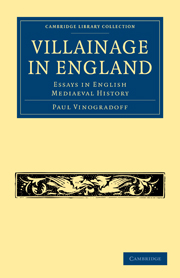Book contents
- Frontmatter
- PREFACE
- Contents
- INTRODUCTION
- FIRST ESSAY: THE PEASANTRY OF THE FEUDAL AGE
- SECOND ESSAY: THE MANOR AND THE VILLAGE COMMUNITY
- CHAPTER I THE OPEN FIELD SYSTEM AND THE HOLDINGS
- CHAPTER II RIGHTS OF COMMON
- CHAPTER III RURAL WORK AND RENTS
- CHAPTER IV THE LORD, HIS SERVANTS AND FREE TENANTS
- CHAPTER V THE MANORIAL COURTS
- CHAPTER VI THE MANOR AND THE VILLAGE COMMUNITY. CONCLUSIONS
- APPENDIX
- INDEX
CHAPTER VI - THE MANOR AND THE VILLAGE COMMUNITY. CONCLUSIONS
Published online by Cambridge University Press: 16 May 2011
- Frontmatter
- PREFACE
- Contents
- INTRODUCTION
- FIRST ESSAY: THE PEASANTRY OF THE FEUDAL AGE
- SECOND ESSAY: THE MANOR AND THE VILLAGE COMMUNITY
- CHAPTER I THE OPEN FIELD SYSTEM AND THE HOLDINGS
- CHAPTER II RIGHTS OF COMMON
- CHAPTER III RURAL WORK AND RENTS
- CHAPTER IV THE LORD, HIS SERVANTS AND FREE TENANTS
- CHAPTER V THE MANORIAL COURTS
- CHAPTER VI THE MANOR AND THE VILLAGE COMMUNITY. CONCLUSIONS
- APPENDIX
- INDEX
Summary
If we look at the village life of mediaeval England, not for the purpose of dissecting it into its constitutive elements, but in order that we may detect the principles that hold it together and organise it as a whole, we shall be struck by several features which make it quite unlike the present arrangement of rural society. Even a casual observer will not fail to perceive the contrast which it presents to that free play of individual interests and that undisputed supremacy of the state in political matters, which are so characteristic of the present time. And on the other hand there is just as sharp a contrast between the manorial system and a system of tribal relationships based on blood relationship and its artificial outgrowths; and yet again it may be contrasted with a village community built upon the basis of equal partnership among free members. It is evident, at the same time, that such differences, deep though they are, cannot be treated as primordial and absolute divisions. All these systems are but stages of development, after all, and the most important problem concerning them is the problem of their origins and mutual relations. The main road towards its solution lies undoubtedly through the demesne of strictly historical in vestigation. Should we succeed in tracing with clearness the consecutive stages of the process and the intermediate links between them, the most important part of the work will have been done.
- Type
- Chapter
- Information
- Villainage in EnglandEssays in English Mediaeval History, pp. 397 - 410Publisher: Cambridge University PressPrint publication year: 2010First published in: 1892

